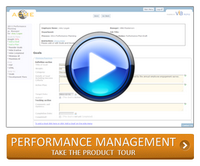What is Performance Calibration?
 Performance Calibration is a process in which managers (typically within a department or function) come together to discuss the performance of employees and achieve agreement on performance appraisal ratings. The process ensures:
Performance Calibration is a process in which managers (typically within a department or function) come together to discuss the performance of employees and achieve agreement on performance appraisal ratings. The process ensures:
- An objective performance appraisal of past performance is made for each employee in relation to others in similar roles and/or job levels, and
- Managers apply similar standards to all employees.
Performance calibration should also be distinguished from talent calibration. Performance calibration is focused on past performance – the relative performance of employees during a period of time and is typically directly linked to compensation. Talent calibration is future focused, aimed at assessing the overall health of the talent pool in the organization, and includes a variety of factors (i.e., potential, capabilities, future organizational talent needs). Effective talent calibration relies upon effective performance calibration.
Yikes!
Unfortunately, performance calibration in the performance appraisal process makes people nervous and is often negatively perceived for two good reasons.

- The term calibration is ‘mechanical’ and impersonal. I don’t think most people want to be calibrated in any way, shape or form.
- The process is confused with forced ranking. In forced ranking, managers make their ratings of employee performance and then are asked to ‘force’ them in a bell curve with specific percentages attached. For example, 20% of employees will be designated as top performers, 70% average performers, and 10% low performers. While forced ranking has successfully been applied in many organizations, it can also facilitate the belief among employees that the performance appraisal process is ‘rigged’ or unfair.
Benefits of Performance Calibration
One of the primary goals of the performance appraisal process is to effectively differentiate high performers from average or poor performers so that high performers can be rewarded and retained. Performance calibration can help organizations achieve that goal, as well as realize several other important benefits.
Performance Calibration serves to increase the accuracy of performance ratings. The collective discussion regarding performance allows managers to have new insight into the performance of employees and reduce potential bias. Peer-to-peer discussion brings about transparency - calling attention to an individual manager's tendency to rate leniently or harshly. Managers become accountable to each other for the performance appraisal ratings made for all employees.
Performance Calibration clarifies and reinforces the criteria for high performance across the leadership team. During a performance calibration meeting, managers will discuss the supporting reasons for the performance evaluation ratings provided. This type of discussion builds a common language around defining performance expectations across all managers. As a result, managers will be better prepared to discussion the reasons behind ratings with employees and create development plans for ongoing performance improvement and career development.
Together, increased accuracy and the clarification of performance criteria increases the likelihood that employees will perceive the performance appraisal process to be fair. Since compensation, promotion and succession decisions are based, in part, on performance evaluation ratings, it is important that employees believe that they are fairly evaluated by their manager. In addition, organizations are more likely to face legal challenges when employees do not believe they are being treated fairly and equitably.
Performance Calibration is an important part of the employee performance management process. Calibration discussions help managers deliver performance appraisals that are accurate and fair and help organizations retain high performers.
Related Articles:
3 Pitfalls to Avoid in Performance Appraisal....or on America's Got Talent
Dread Performance Appraisals? Easy Does It With Ongoing Feedback and Coaching
